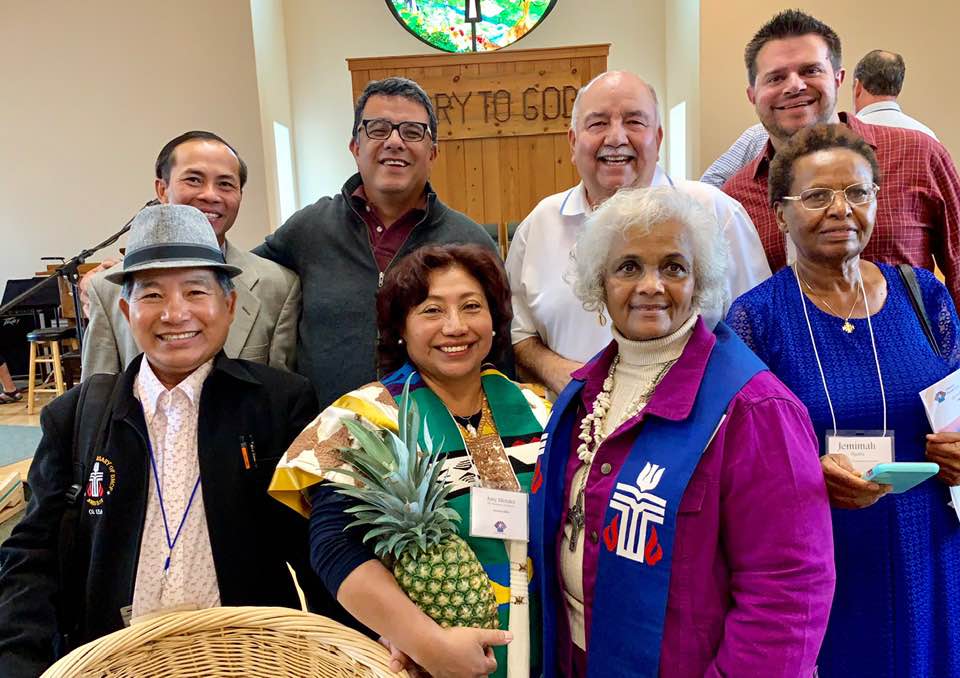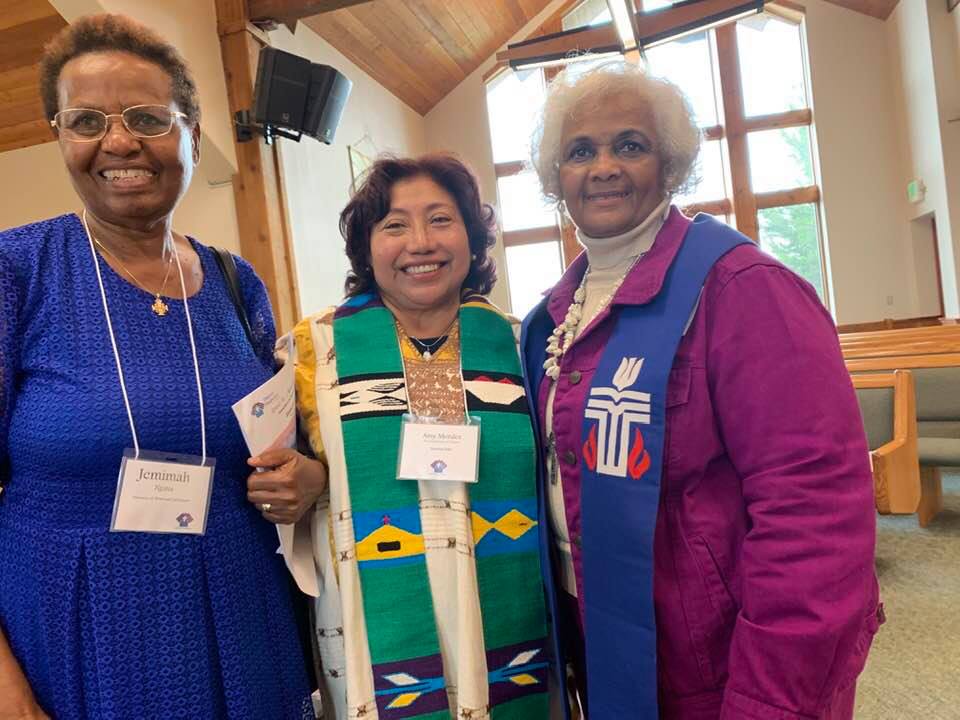San Francisco Theological Seminary's first full-time African American professor
Commemorating 50 years
By Rev. Cornelius O. (“Neil”) Berry Jr. | Special to Presbyterian News Service
SAN FRANCISCO — San Francisco Theological Seminary was established in 1871. In August 1969 under the leadership of President Arnold Come, the trustees of SFTS called the Rev. Dr. Cornelius O. Berry Sr. to join the faculty as their first full-time African American professor. Dr. Berry was an associate professor of systematic theology. He was a faculty member of both SFTS and the Graduate Theological Union located in Berkeley, California. He was also chairman of the Advanced Pastoral Committee and of Area 111 in the GTU until his untimely death in July 1973.
Rev. Berry’s parents left South Carolina in the early 1920s and moved to the Sugar Hill area of Harlem in New York City. They then moved to the southeast Bronx, which was a predominately Jewish community. Dad was born there on Feb. 13, 1926. My father was a product of the New York City public school system, and he skipped three grades. While in the Bronx, he joined the mighty St. Augustine Presbyterian Church at its inception. The Rev. Edler Hawkins was the founding pastor. Edler would later become the first black moderator of the General Assembly of the United Presbyterian Church.
My father was very mischievous as a lad, and one day he went into Rev. Hawkins office and acted up terribly. He then ran out of the church down the streets of the Bronx. My father did not know that Edler had been a track star in college, and he proceeded to catch my father and drag him back to the church by the scruff of his neck. From that day on, my dad was completely devoted to Rev. Hawkins. Rev. Hawkins’ leadership was so great that many of the gifted young men of the Bronx who joined St. Augustine’s decided to become Presbyterian ministers rather than doctors or lawyers. My father was one of these young men, and Rev. Hawkins became a surrogate father to our family.
Dad then attended City College of New York, which was free but highly competitive to get in. He earned his B.A. there and then went on to attend Union Theological Seminary. These were the golden years of Union Seminary of New York with such men as Reinold Neihbur, Paul Tillich and James Muilenburg teaching classes. In his second year at Union, he married his childhood sweetheart and the love of his life, Lois Gwendolyn Palmer. Upon graduation, he took a call to a small Protestant parish in East Harlem. He was then called to Mt. Carmel Presbyterian Church in Newark, New Jersey, where my sister and I were born. He stayed there eight years and while there, he started work on his Ph.D. at Columbia University in New York. He then was called to St. Albans Presbyterian church in Queens, New York, for three years.
These were happy years for my father and mother. These years were made even happier because Dad could frequently visit his only sibling (his two-year-older brother, Creighton Berry) and his family and in Jamaica, Queens. My father and his brother were very close. They were both brilliant in their own ways. Creighton went on to head Gimbels department store’s commercial art department. Gimbels in New York City was the second largest department store in the world at that time. He later founded the Edler Hawkins foundation in New York City for the Presbyterian Church (U.S.A.). He is also considered one of the greatest watercolor artists of his generation.
During this time, he made lifelong friends with the Rev. Clarence Cave and the Rev. Joe Roberts. Clarence became a longtime administrator for ethnic affairs in the General Assembly and was my godfather. Rev. Roberts was honored to be nominated by Daddy King (seven years after his son Martin was killed) to fill the pulpit of Ebenezer Baptist Church in Atlanta.
Dr. Berry was then called in 1961 to the Board of Christian Education in Philadelphia. Dad was only the second black man hired to work for the national church. We were the first black family to live in Merion Station and only because the Quakers sold us a home there. He became a charter member of the Black Presbyterian Union when racial tensions were beginning to rise in the country. Dad’s job at the Board was to fly around the country implementing the newest and the most enriching models of Christian education. To this end, in 1964 he started Vanguard magazine that was sent to the presbyteries and churches of the UPC. In 1963 my sister Alison was born there.
We moved to Alma, Michigan, in 1965, where my father was named the chaplain of Alma Presbyterian College and assistant professor of religion. Dad went down to Montgomery, Alabama, at this time and met and marched with Dr. King. They became friends, and in 1967 he called Dad to discuss his evolving views on the Vietnam War.
In 1969 Rev. Berry received the call to SFTS. He finished his doctoral thesis in nine months and was awarded a Ph.D. in philosophy from Columbia. His thesis was a systematic exercise in proving the existence of the human soul.
When we arrived in Berkeley, Dad stood face to face with the counterrevolution. This caused him a struggle for discernment that any black intellectual born in the 1920s would have. He looked to Tillich’s idea of the “new being” to frame the young people’s quest, in a Christological context.
“Christianity as a religion is not important, for Christianity is more than a religion. It is the New Being that is important. Resurrection is not an event that might happen in some remote future, but it is the power of the New Being to create life out of death, here and now, today and tomorrow. Where there is a New Being, there is a resurrection, namely, the creation into eternity out of every moment of time.” — Paul Tillich
In a surprising move of solidarity with the young people’s movement, he asked if he could have a polished clay peace symbol I had. He had never asked me for anything before in my life. He wore that peace symbol around his neck instead of a cross every day for the rest of his life.
“One of my clearest recollections of my father was when he took us to Jones Beach on Long Island, where everyone from New York and New Jersey vacationed. It was truly amazing to see him swimming against the horizon — he looked like a great white whale. His swimming skills were amazing. The pictures in my mind of him swimming in the ocean are truly epiphanic.” — Author Rev. Cornelius Oliver Berry Jr. (“Neil Jr.”)
Dad’s close friends at the seminary were the Rev. Howard Rice (longtime chaplain of SFTS), the Rev. John Hadsell (longtime administer) and the Rev. Warren Lee (longtime Director of the Advanced Pastoral Department). Rev. Rice and I became great friends during my time as a student at the seminary. One day he called me aside and said, “Neil, your father had a special place in my heart, and he was one of my favorite theologians. He made Tillich understandable to me.”
Upon his death, Dad was working on a book about the black church in America. In 1994 I picked up the baton and took the idea for a course on the history of the black church in America to the African Studies department of the University of Michigan, Flint campus. It was the most popular course in the department, and I taught it there for five years until I took a call to Witherspoon Presbyterian Church in Indianapolis. The course is still taught there to this day.
In conclusion, I would like to quote from the eulogy his good friend and colleague, the Rev. Dr. Benjamin Reist, gave at “The Church by the Side of the Road” in Berkeley in July 1973: “To say ‘poor in spirit’ with reference to my colleague, my friend, and my brother Neil is to utter then a high salute indeed. For Neil’s was that unique kind of poverty of spirit that refused to relinquish the integrity of his own identity in the face of any external definition from left or right, black or white.”
If Dad were alive today, he would be proud to know that the Rev. Dr. Diane Givens Moffett (whose younger brother, Christopher, married his youngest daughter, Alison) was recently named executive director and president of the Presbyterian Mission Agency in Louisville, Kentucky.
Request for Clergy Renewal Grant Application
Denver Presbytery recommends all Sessions maintain a Clergy Renewal (also known as clergy leave or sabbatical) policy for all Ministers of Word and Sacrament who serve their congregation. This policy should be included as part of a Minister’s terms of call. We recommend a 3-month clergy renewal after every 7 years of service. Clergy Renewal is an investment in the long-term future of a congregation and the minister. Denver Presbytery supports that investment by providing Clergy Renewal Grants to assist in funding the time ministers are on leave, defraying the costs of a clergy renewal for congregations. Ministers planning to take clergy renewal in the year 2020 are invited to complete an application and submit a Clergy Renewal Proposal to the Committee on Ministry for consideration.
The grant funding deadline is October 1, 2019 for Clergy Renewal in the year ahead, 2020.
Funding requests may be made by the minister or the Session. The Clergy Renewal Proposal should be approved by the Session prior to submission.
Grants from the Committee on Ministry are prioritized in this manner:
a. Requests from solo-pastors serving a Denver Presbytery congregation.
b. Requests from congregations with fewer than 200 members.
Ministers may request funding for particular activities that pertain to the renewal plan approved by the session.
In the event that ministers from the same congregation request funding, the Committee on Ministry may distribute the grant between the two requesting entities in a proportion that benefits both grant requests.
The minister shall inform the Committee on Ministry of other grants he/she receives.
Clergy Renewal Grant recipients (whether a Session or minister) shall provide the Committee on Ministry a written report on the renewal experience within 3 months of the completion of the clergy renewal time.
The size of a grant in any given year is based on the number of applications received and the amount requested. However, normally no one leave will be funded for more than $10,000. For the 2020 Budget year $50,000 has been requested (proposed budget to be approved at the October Assembly)
To apply, please submit the Clergy Renewal Application (link below) along with a Clergy Renewal Proposal that includes:
Rationale
Timeline
Financial Plan
Benefit to both Minister and Congregation
Thank you for submitting your application and clergy renewal proposal in a timely manner so that it might be considered for funding.
Questions, contact Sandy Safford, Moderator of Committee on Ministry.
2019 August Stated Assembly Meeting
Thank you to Church of the Eternal Hills for hosting our August meeting. We celebrated new staff and elected a new treasurer as Rev. Amy Mendez brought the message of open arms and welcoming.
A Note from our Transitional Presbytery Pastor
Greetings, dear Presbyters,
Tempus fugit, y’all. Time flies. Or, as the phrase is sometimes rendered, time flies when you’re having fun. When my daughter was six years old, she went to a friend’s house to play. She’d heard this phrase, and she’d noticed when visiting this friend, she’d hardly get in the door before it was time to go home. So on this visit, she and the friend decided to maximize their time by not having any fun. They went outside and sat under a tree. They didn’t play with any of the myriad toys available. When a snack was offered, they refused to eat it. They didn’t even talk, other than to say how boring it was to do nothing. After two hours, my daughter came home feeling cheated of an afternoon with her friend. “I don’t care how much time we get; from now on, I’m playing.”
I told you that so I can tell you this: I’ve been your Transitional Presbytery Pastor for nine months, time has flown, and while I’m not exactly playing, I enjoy the work, cherish the staff, and love spending time with you and hearing your stories. Time flies, and I’m having fun.
In these nine months I’ve learned a lot about Denver and ministry on a presbytery scale. Here are a few things I want to share with you:
My title is Transitional Presbytery Pastor, which means I am pastor to the pastors on a temporary basis. But my title also indicates that I’m pastor to the presbytery during this time of transition. Do you see the difference? One version is about me, and the other is about you. You’re the important part. I’m your pastor while you move through this time of change. I’m here for you, and I encourage you to call me, send me an email, make an appointment, show up at my office door, invite me to your church to worship and preach. Let’s talk about you.
Creating a vision for the future and tending to the present reality are separate activities, though they go together like peanut butter and jelly. The Vision Team is still in the “getting to know you” phase of the process. It takes a while to know people, and Presbyterians tend to be good at only sorta knowing each other. You might have spent your entire life in the same church with the same people, but do you know what brings them joy? Do you know how they relate to God? Do you know how they relate to the world? Do you know if they project an “everything’s fine” attitude while in their hearts, they hurt, doubt, question, and feel entirely alone for having those feelings? In order to dream together, to lean into God’s purpose for our presbytery, to understand and respect the voice of every person on the Vision Team, the Team must do the work of being still, of listening, of letting our comrades see us for who we are and as we are.
At the same time, there are daily decisions that must be made that affect how we do what we do as a presbytery. These are decisions pertaining to staffing, management, accounting, efficiency and effectiveness. Most of these decisions are independent of the visioning process, and few, if any, can wait until the Vision Team has completed their task.
There’s no timeline for the Vision Team; their work will be finished when they say it’s finished. In the meantime, the Presbytery continues to function with committees and work groups and partnerships, oh my, that plan for the near future, while the Vision Team talks, prays and listens for God’s leading toward the larger future. My job is to lead the Vision Team and to tend to the daily-ness of being Denver Presbytery.
Change started happening the day Tom Sheffield turned in his key. I didn’t bring it and it won’t leave with me when I turn in my key. Change R Us. It’s what we do; it’s who we are. We may say we don’t like it, but we know in our souls that it’s necessary. If we didn’t change, we’d still be holding the first breath we took when we entered the world. We’d all be Catholics listening to the Mass in Latin. We’d still expect people to come to church on Sunday no matter who they are or how they were raised or whether or not they know who Jesus is. I repeat, CHANGE R US.
God loves you. That’s not news, is it? You know that, right? I hope you’ve known since that first breath mentioned in #3. If that’s not the case, I pray you will try knowing it. Take a deep breath and let that truth enter your body like air into your lungs. Let it bring you to the surface to float on a sea of grace. Now find someone who is struggling to get a nostril above the waterline and tell them. You will see them rise.
Rev. Dana Hughes
Transitional Presbytery Pastor
A bold vision and invitation from Presbyterian Mission Agency
What is a Matthew 25 church?
Matthew 25:31–46 calls all of us to actively engage in the world around us, so our faith comes alive and we wake up to new possibilities. Convicted by this passage, both the 222nd and 223rd General Assemblies (2016 and 2018) exhorted the PC(USA) to act boldly and compassionately to serve people who are hungry, oppressed, imprisoned or poor.
How the vision unites all Presbyterians
By accepting the Matthew 25 invitation, you can help our denomination become a more relevant presence in the world. We recognize Christ’s urgent call to be a church of action, where God’s love, justice and mercy shine forth and are contagious. And we rejoice how our re-energized faith can unite all Presbyterians for a common and holy purpose: our common identity to do mission.
We invite you to join us on this journey! Become a Matthew 25 church.
About the Matthew 25 mark
The circular shape represents unity and equality. Like God, a circle has no beginning and no end, and it symbolizes our continuing effort to help one another. The shape also suggests a globe that points to our engagement with the world.
The three interlocking figures represent the equality of all people without gender or race bias. They have their arms around each other, symbolizing friendship, protection and service. The number three suggests the three focus areas of congregational vitality, structural racism and systematic poverty, as well as the Trinity.
The color palette is bright, lively, friendly and energetic — suggestive of our active commitment.
Finally, the legend “Matthew 25” below the symbol is the literal identification of the mark. We use a handwritten font to make the point that active engagement in the world requires human effort.
2019-2021 Book of Order Now Available
Download the 2019/2021 Book of Order or order hard copies online.
Also available in Korean, Spanish, Braille, and large print.













